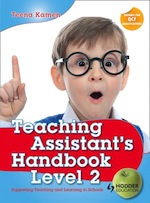This article is a continuation summary of the Teaching Assistant’s Handbook Level 2 by Teena Kamen, chapters 7 to 14. Summary of the first part of the book.
7 Supporting Learning Activities
A guide for the QCF unit ‘Supporting Learning Activities’.
In this chapter, the book discusses the way children learn and think,
including cognitive developmental theories such as Piaget, Vygotsky and Bruner. Learning pathways and experiences are mentioned and activities are encouraged, in order to think about the process of learning.
The different types of learning styles are detailed:
- Visual Learners – observation/reading
- Auditory Learners – listening to instructions
- Kinaesthetic Learners – through movement
- Analytic Learners – organising into logical pieces
- Global Learners – focusing on main ideas, not details
The curriculum framework
Long, medium and short term plans are discussed with key tasks and how the teaching assistant supports the teacher. The chapter includes details on how to plan learning activities based on individual needs – including selecting resources and observation and recording of responses. A planning sheet example is provided.
Each aspect of preparing, delivering and evaluating the learning activity is discussed in detail.
8 Supporting positive behaviour
A guide for QCF unit ‘Support positive behaviour’.
The eighth chapter of this book talks about the expectations of behaviour – parental and school expectations. Pupil behaviour is influenced by a number of external factors, which are discussed.
There are 8 suggested ways to encourage children’s positive behaviour and how staff in schools act as role models for the pupils. Examples of ‘school code of conduct’ are given.
Rewarding pupil behaviour is an important part of this chapter and details are given on how this can be implemented.
Difficult behaviour is discussed, along with how to recognise patterns of behaviour. Plans to help support difficult behaviour are given.
9 Improving own team and practice
A guide for QCF unit ‘Improve own team and practice’.
This chapter focuses on the effectiveness of teamwork and the importance of communicating with colleagues. There are a number of ways teaching assistants interact with other members of staff and this chapter encourages and examines positive working relationships.
10 Supporting the use of ICT for teaching and learning
A guide for QCF unit ‘Support the use of ICT for teaching and learning’.
ICT (Information and Communication Technology) is stressed as an important part of the national curriculum in this chapter and safety around the equipment is discussed. School policies and data protection are detailed and the various skills at primary/secondary school level.
A detailed list of ICT risks are included and how to deal with them.
11 Supporting learning environments
A guide for QCF units:
- ‘Contribute to supporting bilingual leaners’
- ‘Prepare and maintain learning environments’
- ‘Provide displays in schools’
- ‘Support children and young people’s play and leisure’
There are various aspects to the preparation of classes, such as adequate floor space and lighting/ventilation. Organising and checking classroom resources is an important part of this unit. Another important aspect is supporting English as an additional language.
12 Supporting special educational needs
To be used for QCF units:
- ‘Support children and young people wit disabilities and special educational needs’
- ‘Move and position individuals’
- ‘Provide support for therapy sessions’
This chapter focuses on SEN (Special Educational Needs) and the legislation related to the topic. Assessments and plans are detailed – an example of an Individual Education Plan is given. Most importantly, the roles of those who support SEN pupils are given and a list of ways to support these pupils are detailed.
As an SEN teaching assistant, you would need to know exactly how to move pupil’s with physical disabilities. This chapter gives information on how this is done.
13 Supporting the wider curriculum
This is a guide for QCF units:
- ‘Support children and young people at meal or snack times’
- ‘Support children and young people’s travel outside the setting’
- ‘Support extra-curricular activities’
This chapter explores the basic knowledge of food hygiene, preparing food and also dietary requirements.
Schools trips and the safety of these trips are explored.
14 Supporting assessment for learning
A guide for QCF unit ‘Support Assessment for Learning’.
This chapter explores ways to help pupil’s development and raise achievements. Formative assessments and learning goals are discussed along with assessment forms and school reports.
>> Information on Teaching Assistant qualifications and courses
